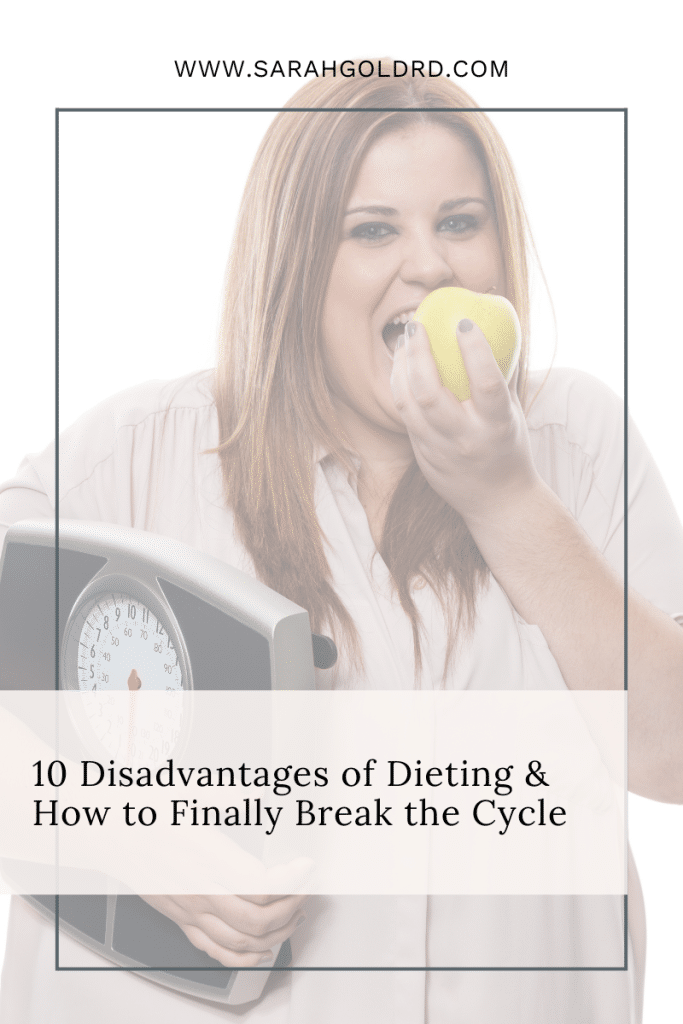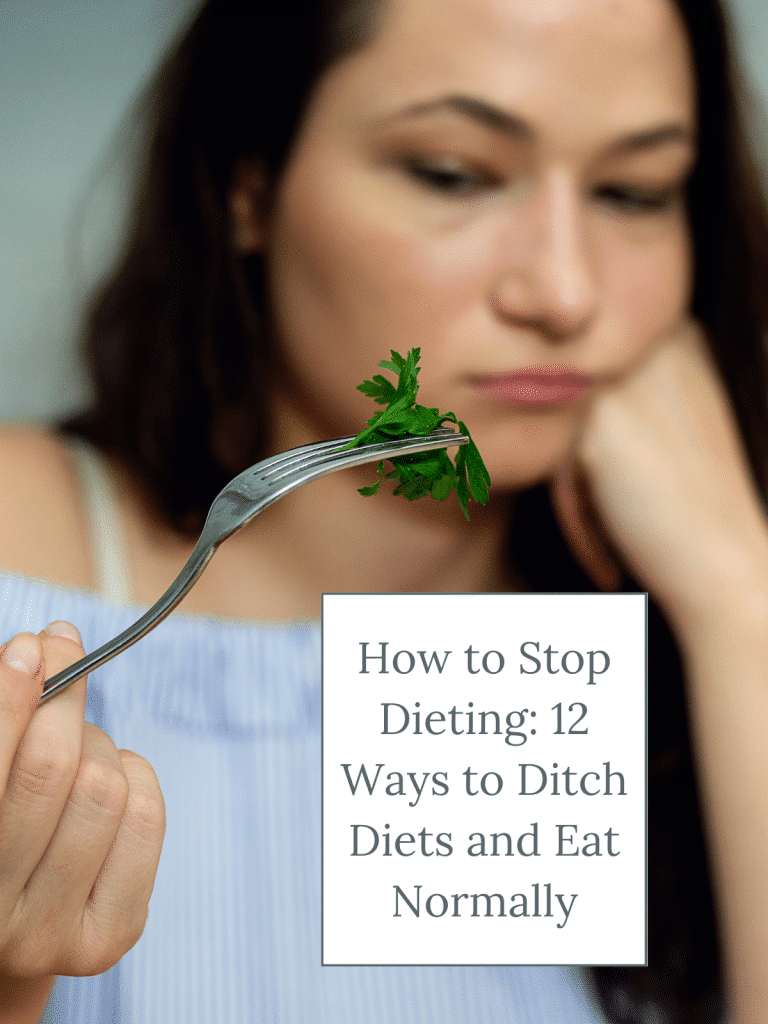10 Disadvantages of Dieting and How to Finally Break the Cycle
Diets are literally everywhere you turn. It seems like every day there is a new diet that’s promising fast results. But if diets actually worked, would we be looking for a new one every month?
Still, it can be oh so tempting to try another one. It will be different this time, right?
Maybe you’re starting to question whether it’s worth it. Or if it’s even possibly harmful. If you’re unsure if you should try another diet and want to understand the evidence surrounding the disadvantages of dieting, read on. (And stick around to the end for what you can do instead).
What is a diet?
Before we can talk about the disadvantages of dieting, let’s get on the same page about the definition of a diet.
On the very basic level, a diet is just a way to describe how someone eats. But when we talk about dieting, the term diet is a way to describe a set of rules that govern how you eat. Typically diets are used as a way to lose weight, but people may go on restrictive diets in hopes of addressing other health concerns.
This may include well known diets like WW, keto, intermittent fasting, Optavia, Paleo, Whole 30 or Noom. It can also be as simple as eating low-carb or calorie counting. Or putting foods in categories of “good” or “bad.”
But diets may also present in sneakier ways such as eliminating certain foods (other than having an allergy) in an effort to change your body. And diet companies are getting better at disguising their diets under the guise of mindful eating or even using words like eating intuitively even if they’re promising weight loss.
You might be wondering: dieting is so common, what’s the harm in all of this? Let’s dig into the disadvantages of dieting.

What are the disadvantages of dieting?
You may have realized that diets don’t work for you, or feel like you’re not good at dieting. But did you know that there are actually scientifically backed disadvantages of dieting?
Most diets lead to long-term weight gain
Wait, what? Yes, it’s true. Dieting is one of the strongest predictors of weight gain and up to two-thirds of dieters regain more weight than they lost while dieting.
Most diets work initially, meaning you might lose weight in the short term. If you’ve ever lost weight on a diet only to gain it back in weeks, months, or even years, you’re not alone. Upwards of 95 percent of people regain the weight they lost dieting within 6 months to 5 years.
It’s important to note that this is not your fault. This is a direct result of diet culture failing you.
This happens because diets:
- Are not sustainable (if you can’t do it forever, the results won’t be forever)
- Most diets don’t leave room for living life (parties, holidays, vacation, etc.)
- Our bodies fight back hard when they’re not fed enough by increasing the drive to eat, slowing your metabolism, and adjusting hormones that lead to weight regain
In fact, chronic dieting can slow your metabolism
Chronic dieting (i.e. dieting on and off for many years or dieting for a long period of time) can result in a slowed metabolism.
When dieting, your body adapts to a reduced energy intake. Your metabolism slows to hold on to the energy it’s getting through food, and learns to live on less.
A study of “The Biggest Loser” competitors found that metabolic adaptations to dieting continue over time, and six years later the contestants’ metabolisms were still 700 calories per day lower than when they started, even after they had regained almost all of the weight they had lost.
Dieting can lead to increased cravings and feeling out of control around food
Your body is smart. When you restrict your food and energy intake, your body responds by driving you to eat more. Certain hormones and neurotransmitters are stimulated, which boosts hunger and cravings (particularly carbohydrates).
Studies have shown that compared with non-dieters, dieters experience stronger cravings for foods that they were restricting.
Related: Always craving sweets? Grab my free guide with 5 steps to take control of sugar cravings.
Dieting leads to an all or nothing mentality
Dieting encourages a binary way of thinking about food or nutrients. For example, food is either good or bad or allowed or not. This often leads to you feeling like you’re either “on” or “off” a diet, and swinging from being super restrictive or eating “healthy” to binging on all the things and rarely eating a vegetable.
Enhanced feelings of guilt and shame around food
It’s almost inevitable that a diet will eventually fail, which often leads to you feeling like a failure. This increases feelings of guilt and shame around food because diets make you feel like you did something wrong or there’s something wrong with you for not being able to stick to it.
It’s important to remember that it’s not your fault, and most likely the diet was not realistic (for anyone) to do for the long term.
Frustration when you’re not following the diet perfectly
Ever felt frustrated and exhausted that you don’t have the willpower to push through and follow a diet perfectly? You are not alone.
Newsflash: it’s not willpower. It’s biology. Your body needs energy to function properly, and most diets cut calories or carbs so much that your body fights back by increasing the drive to eat. This often feels like a loss of control and leads to feelings of frustration.
That loss of control is actually a natural response to restriction. Your body is trying to tell you that it isn’t happy and that you need food!
Most diets are designed to fail
Diets aren’t sustainable and haven’t been designed to be followed long-term. Sure, any attempt at restriction is likely to result in weight loss in the short term, and that’s what you’ll see in the marketing.
Most weight loss studies only look at what happens in the first 3 to 6 months, with few actually following participants for a year or more to see what happens long term.
However, there have been some longer-term studies to show that most people regain the weight they lost within one to five years, and many people end up at a higher weight than when they started.
Dieting negatively impacts your mental health
Dieters are eight times more likely to suffer from an eating disorder by the age of fifteen than non-dieters and dieters (even pseudo-dieters) are more likely to suffer from mental health issues like depression, disordered eating, low-self esteem and overall psychological distress.
Dieting can be time-consuming and socially isolating
Weighing out your meals, counting calories or macros and painstakingly analyzing menus is a time and energy drain. If dieting is holding you back from doing the things you love with the people you love, then it isn’t healthy.
Many dieter skip social events or stress about travel and parties because they don’t have as much (or any) control over their food choices. If dieting is holding you back from social activities, enjoying holidays and vacations, or maintaining relationships then it may be time to give dieting a break.
Most diets don’t actually center around improving health
This one’s a biggie. Despite claims that losing weight equals better health, studies actually show the opposite. Dieting is linked to increased risk of premature death and heart disease (independent of your weight).
Studies looking at the effects of yo-yo dieting (known in the literature as weight cycling) have seen that yo-yo dieters have twice the normal risk of dying of heart disease and a higher overall death rate.
Still not convinced? The Harvard Alumni Health Study saw many more side effects of weight loss including headaches, menstrual cycle irregularities, fatigue, dry skin and hair loss. Yikes.

Ok, I get that dieting is harmful, but what do I do instead?
We’ve outlined the disadvantages of dieting and demonstrated why diets, cleanses, detoxes and weight-loss plans probably aren’t a good idea…but what’s the alternative?
Enter, intuitive eating. Intuitive Eating is an evidence-based framework for self-care, health, and body acceptance. It’s a framework to help you move towards a healthier relationship with yourself, food and movement.
To get started, read How to Stop Dieting. 12 Tips to Ditch Diets and Eat Normally.
Get the support you need to break the dieting cycle
Breaking free from dieting isn’t easy. For many people, it can require moving towards body and size acceptance, which is hard. It is an uncomfortable place to be in if you have spent most of your life working towards weight loss and shrinking yourself.
You may find it helpful to work with a professional to process your feelings and have someone to navigate the bumps in the road (because there will be bumps), and cheer you on, especially if you are lacking community and support on this journey.
In my practice I help women break the cycle of dieting with my signature UNDIET method, while learning to feel good around food and in their bodies.
Key takeaways on the disadvantages of dieting
Dieting can take a toll on all aspects of your physical and mental wellbeing, even impacting your social life and self-confidence. But it’s never too late to break away from diet culture and stop dieting for good. Eating intuitively can help you rebuild your relationship with food, movement and your body.







Very informative and useful article. Learned a lot. Thank you.
Hi Dylan – thanks for reading! So glad it was helpful to you!